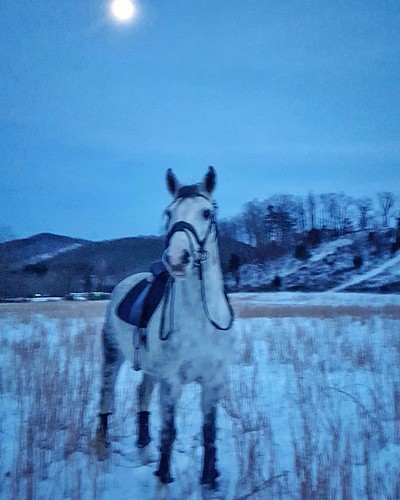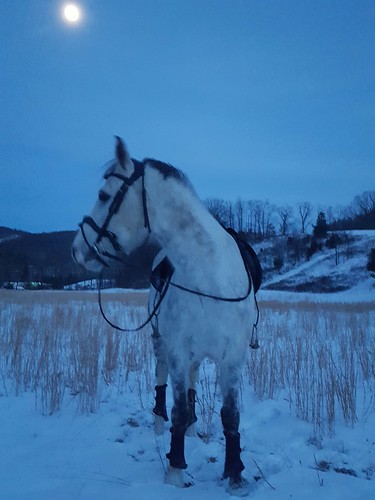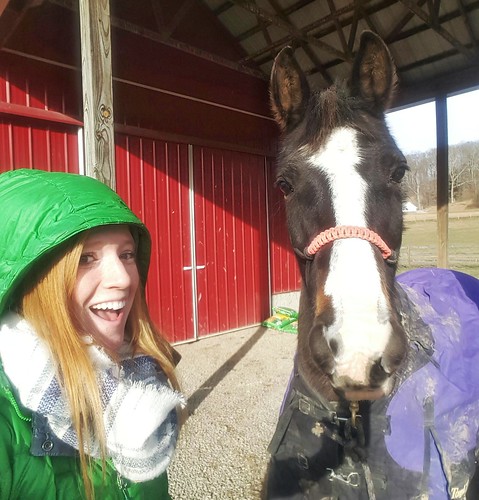As Mel notes, neither partner or pet is better than the other - and I agree. They're different and special in their own ways.
Griffin
Griffin is just like Mel's ML - a pet. He's friendly to a fault and always wants to be around me and anyone else in the field - human, horse, dog, or otherwise. Most photos I get of him involve his nose in my camera because he is constantly wanting to be RIGHT beside me.He's got an insatiable need to please, too, unlike any horse I've ever been around. He wants to work, he loves any and all jobs I've given him (although he absolutely loves jumping the most), and wants absolutely nothing more than to provide me with The Right Answer when we're working. I routinely refer to him as "my very large dog with hooves" to my non-horse friends.
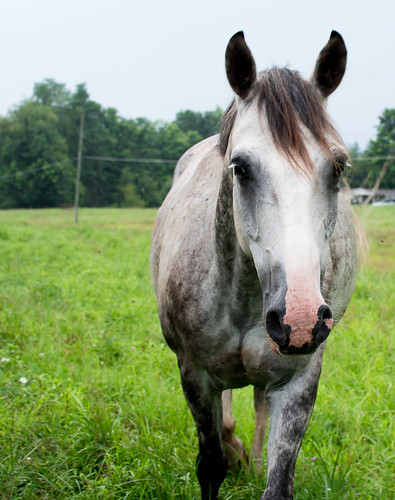 |
| Walking toward me. Forever and always the most common photo I have of him. |
When I bring Q or Stan (or both) in from the field, it is nigh impossible to not bring Griffin. He almost ALWAYS volunteers himself to come, too. He wants nothing more than to be with me. If I work other horses in the barn/barnyard, he waits by the gate for the entirety of the time I'm with the other horses. The only time this wasn't true was when he decided he could no longer bear giving riding lessons to newbies and he would NOT be caught for anything. Any time Griffin alters from his in-my-pocket demeanor, I know something is up and evaluate how to make changes to resolve the problem.
I'm a total sucker for Griffin being such a sweetheart, too, and give him ample treats from my pocket which has only reinforced his behavior through the years. #sorrynotsorry I absolutely adore Griffin, his temperament, his trust in me, and the relationship we have. I think working with him from a young age really helped hone his temperament, the trust, and the relationship.
Stan
Back in the day, Stan and I were closer than close. I had but to think a thing for him to do a thing. He was a partner and a pet and mostly my close friend with whom I could do anything. He was kind of an extension of myself. We spent 5 years apart and he was a pasture puff during that time. Now we're coming back into a relationship and I'm not quite sure how it will end up so far as the partner - pet spectrum.Stan definitely resents being pulled away from a cushy retirement to re-enter the working world. And I don't blame him! Additionally, he's finally living with mares for the first time in a very long time, so he is quite loathe to leave his ladies to spend time with me. And that is also understandable, considering he lived in one place for 11 years and has now been plopped into a totally new environment. I've been very understanding of the herd dynamic change in his life and have not pushed any steady regimented work on him beyond about one or two rides a week - usually Lauren riding him - since he joined me on July 31. I know all too well how herd dynamics can influence a horse's behavior, and I wanted him to have time to settle in knowing I'd start anew with a schedule for him in January.
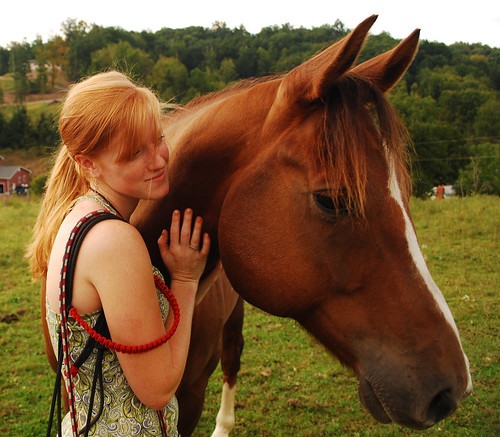 |
| From the days we used to just hang out together before and after work was done. |
While much of Stan not seeking me out in the field is due to the new herd dynamic, I can't ignore that in our time apart Stan has grown creakier with his increasing age which may be influencing how he views time with me. When I'm sore, I don't want to do anything with anyone (especially a person who instigates activities that make me sore), so I can't fault him for it either. I'm hoping that efforts to keep him working for a minimum of 20 minutes a day 3 - 4 days a week (plus supplements in the near future) will help combat this and make him a bit more willing to be a working partner for me as time goes on. I'm not at all concerned with the in-between no-man's-land we're dealing with right now because I haven't had Stan in any kind of steady work to really judge. He's only been back in my life for 5½ months. The real work is just beginning and we'll have to see where we are at in a few months. Time and miles do a lot for a relationship - and from my experience, usually for the better.
Q
Q entered my life as a partner, strictly. In fact, when I bought her, while I hoped she'd be a grand endurance mount, I wasn't even sure I'd keep her forever and ever. Our first year was one of learning one another. Q has an aloof personality which is likely due to being passed around between a minimum of five people prior to entering my life (and that was all before she turned 6!) As we moved into the second year, we were finally starting to be more than strangers, though not quite friends.My personal relationships with a person or two resulted in me being a total shitbag to Q in 2014 and I spent 2015 rebounding from that; being overly critical (i.e., a shitbag) to a sensitive horse will leave you years of mess to clean up - learn from me and don't do it. We were on the up and up in 2016, my mess of 2014 mostly resolved except for lingering spooking. We completed a 100 last year and didn't hate one another afterward (minus that moment at mile ~44 where she spooked at a deer and dumped me...I hated her a LOT in that moment).
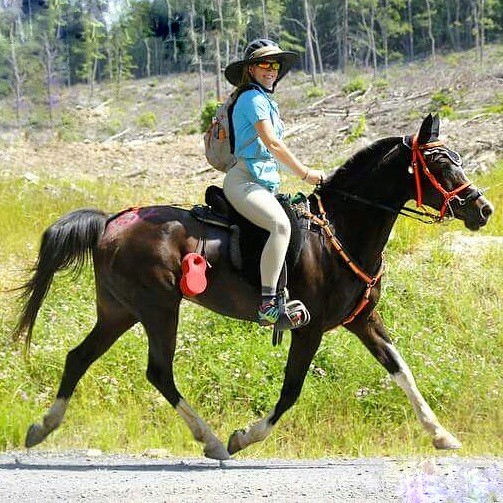 |
| Q, my business partner for 100 miles |
While mostly a partner in the past, I can't help but wonder how much toward pet Q will migrate as time goes on. Slow, quiet one-on-one work builds my relationship with this mare. That is exactly the kind of work that is going to be paramount in our time together over the next many months. As with Stan, I'll have to revisit the pet-partner relationship with Q a few months down the line.
A follow up thought
I think there is great value to horses that are partners, horses that are pets, and those who can be a little bit of both. There really isn't a bad result to any option. It's absolutely personal preference. You still have a bond with that animal in some manner regardless of whether they're more in-your-pocket or strictly a business partner, per se. Personally, I enjoy a dynamic that involves aspects of both and I can honestly admit that having a horse who was strictly my partner would be more difficult for me at this point in my life. (I say "this point" because I can absolutely see where I may prefer differently one day.)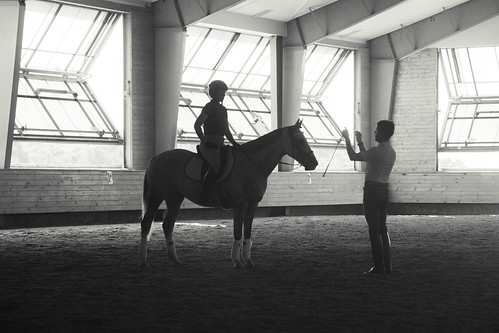 |
| A hard working partner with unquestioning trust of a pet |
However, in my reflection of my horses and how they fall on the pet-partner spectrum I am left pondering one thing in particular: the way the horse's early years were spent and how that influenced them. Let's review --
Griffin was passed around frequently for about six months (to three homes) following his weaning, but each new home was short in duration. He was too young to start under saddle so he mostly traveled around meeting new horses and eating as he was handled by different folks. He came to me at 1½ years old and has been with me ever since. It's all chronicled on this blog. And he's had a great life with me, if I do say so myself. He was started slowly and we have built a great relationship over the past five years together. Griffin trusts me implicitly as a result, which is a very big factor in our every interaction. If I ask something of him, he doesn't fret, fear, or worry, he simply tries to find the correct answer that garners the praise he seeks (be it a release of pressure, kind words, treats, etc.) and life moves forward.
Stan was with his breeder to age 4, then was gelded and brought to his next home where he stayed for 11 years before re-entering my life as my horse last year. Stan was never presented with a reason to distrust people. He was started between 3 and 4, was green when I met him, and when I was 16, I put most of the miles on him to make him go from "green" to "broke". I was never mean or pushy and Stan learned what was acceptable and what wasn't through time and miles. I learned a lot, too. Freedom to enjoy one horse in that manner at that age resulted in a lot of blind trust in Stan. And for me, blind trust was a beautiful thing at that point in my life. I didn't necessarily abuse it or push it to crazy limits by any means - and I'm grateful Stan didn't either - but not being told I couldn't do something meant that we tried a lot of things that would cause me hesitation today. A level head and some blind trust built a great relationship and a great foundation for Stan.
Q differs from both geldings. She was bred, then sold to lady #1, passed along to lady #2, then sent to the cowboy, then went on trial to lady #3, then went back to the cowboy, and then came to me. The reasons for being passed along to folks beginning with lady #1 all revolved around her being "too much horse". Mostly, she was hotter than your typical quarter horse (the most common horse in this area, see: Stan) and really needed one person to be around as she learned what was okay and not okay. She also needed that one person to be patient and not react with anger, force, or aggression (the three things that cowboy did). Her 4½ years spent with me support this wholly; the more time she's with me and the more patient, calm, and consistent I can be, the better she is and the more she trusts me and exhibits pet-like qualities instead of exclusive partner qualities. Her guarded personality has blossomed and bloomed.
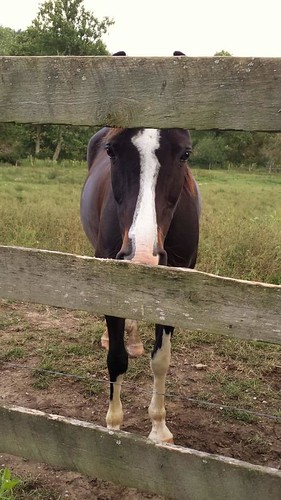 |
| Seeking me out. |
And while I certainly recognize that the temperament of an animal will vary and that there are absolutely bad eggs out there, I wonder about those early years of training and how they correlate to where a horse falls on the pet-partner spectrum?
Certainly other variables factor in over time, too, like how many homes a horse has had, the quality of those homes/their people, and the horses' breeding and tendency to be hotter or quieter. But for the sake of this argument, let's assume no matter the breed, if a horse was brought up by someone knowledgeable, patient, and consistent in a training schedule, would that horse develop more on the pet side of the spectrum or the partner side of the spectrum? Does correct early training that builds more trust provide a higher frequency of horses with pet-like qualities? Or are those things purely temperament based?
Thank you Mel for providing the prompt for this thought process. Animal behavior is absolutely fascinating to me and I've really enjoyed thinking about the pet-partner spectrum as it applies to my horses and potential training of other horses.
So how about you? Where do your horses fall on the pet-partner spectrum? What kind of horse do your prefer? Do you think training plays a part in where a horse falls on this spectrum? Leave a comment below or perhaps compose your own post. I'm interested to see where this discussion goes!

